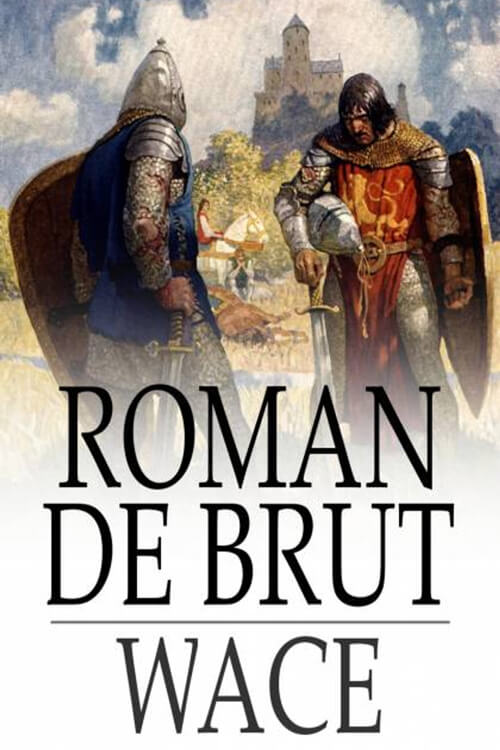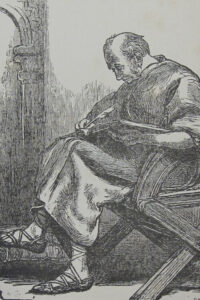
Arthurian Chronicles: Roman de Brut
In the long line of Arthurian chroniclers, Geoffrey of Monmouth deservedly occupies the first place. The most gifted and the most original of their number, by his skillful treatment of the Arthurian story in his Historia Regum Britanniae, he succeeded in uniting scattered legends attached to Arthur’s name, and in definitely establishing their place in chronicle history in a form that persisted throughout the later British historical annals. His theme and his manner of presenting it were both peculiarly adapted to win the favor of his public, and his work attained a popularity that was almost unprecedented in an age that knew no printed books. Not only was it accepted as an authority by British historians, but French chroniclers also used it for their purposes.
About the year 1150, five years before the death of Geoffrey, an Anglo-Norman, Geoffrey Gaimar, wrote the first French metrical chronicle. It consisted of two parts, the Estorie des Bretons and the Estorie des Engles, of which only the latter is extant, but the former is known to have been a rhymed translation of the Historia of Geoffrey of Monmouth. Gaimar’s work might have had a longer life if it had not been cast into the shade by another chronicle in verse, the Roman de Brut, by a Norman poet, Wace, which fills an important and interesting place among our Arthurian sources, not merely because of the author’s qualities as a poet and his treatment of the Arthurian story, but also because of the type of composition that he produced. The metrical chronicle occupies an intermediate position between the prose chronicle, one of the favorite forms of medieval monastic production throughout Europe, and the metrical romance, which budded and blossomed most richly in France, where, during the last half of the twelfth century, it received its greatest impulse from Crestien de Troies, the most distinguished of the trouvères. The metrical romances were written for court circles and were used as a vehicle for recounting adventures of love and chivalry, and for setting forth the code of behavior which governed the courtly life of France at that period. Wace’s poem, though based upon chronicle history, is addressed to a public whose taste was turning toward chivalric narrative, and it foreshadows those qualities that characterized the verse romances, for which no more fitting themes could be found than those supplied by the stories of Arthurian heroes, whose prowess teaches us that we should be valiant and courteous. Wace saw the greater part of the twelfth century. We cannot be certain of the exact year of his birth or his death, but we know that he lived approximately from 1100 to 1175. Practically all our information about his life is what he tells us in his Roman de Rou:—
“If anybody asks who said this, who put this history into the Romance language, I say and I will say to him that I am Wace of the isle of Jersey, which lies in the sea, toward the west, and is a part of the fief of Normandy. In the isle of Jersey, I was born, and to Caen, I was taken as a little lad; there I was put at the study of letters; afterward, I studied long in France.[1] When I came back from France, I dwelt long at Caen. I busied myself with making books in Romance; many of them I wrote and many of them I made.”
Read or download Book
Robert Wace
Wace (c. 1110 – after 1174), sometimes referred to as Robert Wace, was a Medieval Norman poet, who was born in Jersey and brought up in mainland Normandy (he tells us in the Roman de Rou that he was taken as a child to Caen), ending his career as Canon of Bayeux.
Life
All that is known of Wace’s life comes from autobiographical references in his poems. He neglected to mention his birthdate; sometime between 1099 and 1111 is the most commonly accepted period for his birth.
The name Wace, used in Jersey until the 16th century, appears to have been his only name; surnames were not universally used at that time. It was quite a common first name in the Duchy of Normandy, derived from the Indo-European personal name Wasso. The spelling and the pronunciation of this name were rendered in different ways in the texts, according to the place where the copyists were from. In the various versions of the Roman de Rou, his name appears five times as Wace, then Gace (once), Vace, Vacce, and Vaicce (three times together). Until the 11th century, the w spelling corresponded to the pronunciation (like in English) in Northern Normandy (including the Channel Islands), but it shifted in the 12th century. South to an isogloss corresponding more or less to the Joret line, had been turned to and later (like in common French). Today the name survives as the patronymic surname Vasse in Normandy and the North of France and Gasse further south (including also Normandy).
It is speculated that he may have been of aristocratic origin, as he was sent to Caen to be educated, which would have been virtually impossible for most. His detailed writing on maritime matters may have stemmed from his island upbringing.
Around 1130 Wace returned to Caen and took ecclesiastical work, possibly as a teacher.
The date of Wace’s death is uncertain. The most recent event described in the Roman de Rou may be dated to 1174. In the Rou, Wace also mentions Henry the Young King as living. The latter lived until 1183, which means that Wace probably did not revise the Rou after that date.






